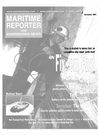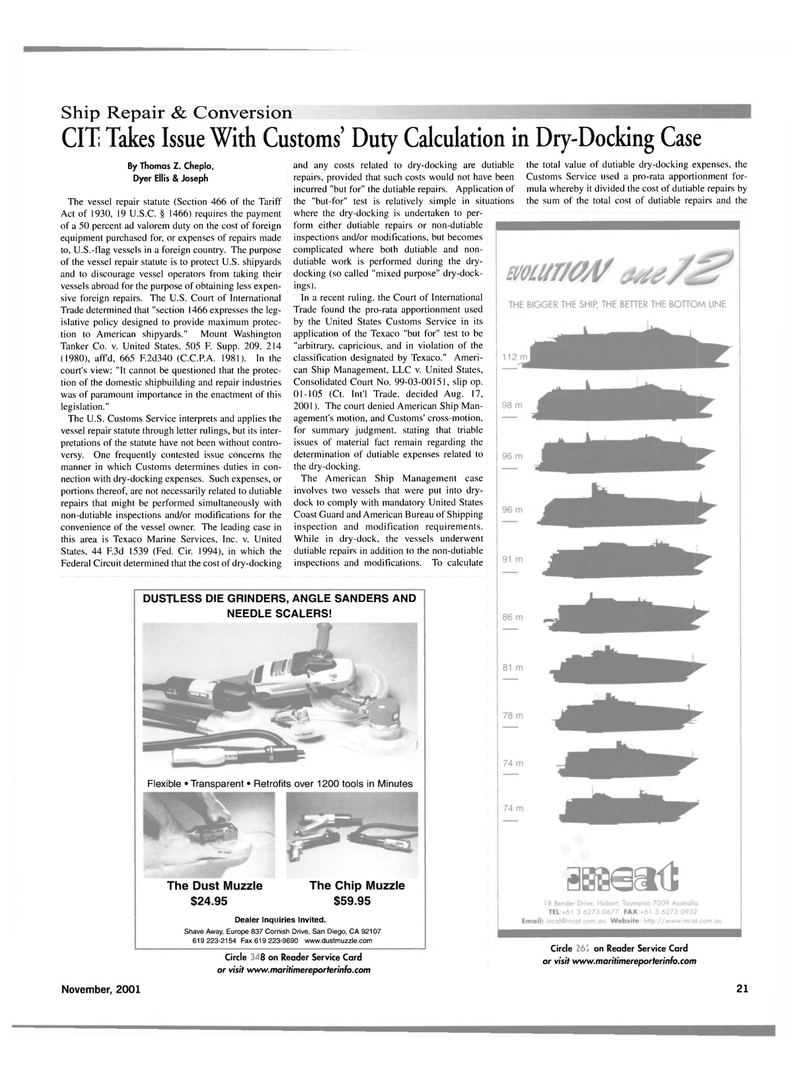
Page 21: of Maritime Reporter Magazine (November 2001)
Read this page in Pdf, Flash or Html5 edition of November 2001 Maritime Reporter Magazine
Ship Repair & Conversion
CIT Takes Issue With Customs' Duty Calculation in Dry-Docking Case
By Thomas Z. Cheplo,
Dyer Ellis & Joseph
The vessel repair statute (Section 466 of the Tariff
Act of 1930, 19 U.S.C. § 1466) requires the payment of a 50 percent ad valorem duty on the cost of foreign equipment purchased for, or expenses of repairs made to, U.S.-flag vessels in a foreign country. The purpose of the vessel repair statute is to protect U.S. shipyards and to discourage vessel operators from taking their vessels abroad for the purpose of obtaining less expen- sive foreign repairs. The U.S. Court of International
Trade determined that "section 1466 expresses the leg- islative policy designed to provide maximum protec- tion to American shipyards." Mount Washington
Tanker Co. v. United States, 505 F. Supp. 209. 214 (1980), affd, 665 F.2d340 (C.C.P.A. 1981). In the court's view: "It cannot be questioned that the protec- tion of the domestic shipbuilding and repair industries was of paramount importance in the enactment of this legislation."
The U.S. Customs Service interprets and applies the vessel repair statute through letter rulings, but its inter- pretations of the statute have not been without contro- versy. One frequently contested issue concerns the manner in which Customs determines duties in con- nection with dry-docking expenses. Such expenses, or portions thereof, are not necessarily related to dutiable repairs that might be performed simultaneously with non-dutiable inspections and/or modifications for the convenience of the vessel owner. The leading case in this area is Texaco Marine Services, Inc. v. United
States, 44 F.3d 1539 (Fed. Cir. 1994), in which the
Federal Circuit determined that the cost of dry-docking and any costs related to dry-docking are dutiable repairs, provided that such costs would not have been incurred "but for" the dutiable repairs. Application of the "but-for" test is relatively simple in situations where the dry-docking is undertaken to per- form either dutiable repairs or non-dutiable inspections and/or modifications, but becomes complicated where both dutiable and non- dutiable work is performed during the dry- docking (so called "mixed purpose" dry-dock- ings).
In a recent ruling, the Court of International
Trade found the pro-rata apportionment used by the United States Customs Service in its application of the Texaco "but for" test to be "arbitrary, capricious, and in violation of the classification designated by Texaco." Ameri- can Ship Management, LLC v. United States,
Consolidated Court No. 99-03-00151, slip op. 01-105 (Ct. Int'l Trade, decided Aug. 17, 2001). The court denied American Ship Man- agement's motion, and Customs' cross-motion, for summary judgment, stating that triable issues of material fact remain regarding the determination of dutiable expenses related to the dry-docking.
The American Ship Management case involves two vessels that were put into dry- dock to comply with mandatory United States
Coast Guard and American Bureau of Shipping inspection and modification requirements.
While in dry-dock, the vessels underwent dutiable repairs in addition to the non-dutiable inspections and modifications. To calculate the total value of dutiable dry-docking expenses, the
Customs Service used a pro-rata apportionment for- mula whereby it divided the cost of dutiable repairs by the sum of the total cost of dutiable repairs and the
DUSTLESS DIE GRINDERS, ANGLE SANDERS AND
NEEDLE SCALERS!
Flexible • Transparent • Retrofits over 1200 tools in Minutes
The Dust Muzzle $24.95
The Chip Muzzle $59.95
Dealer Inquiries Invited.
Shave Away, Europe 837 Cornish Drive, San Diego, CA 92107 619 223-2154 Fax 619 223-9690 www.dustmuzzle.com
Circle 280 on Reader Service Card or visit www.maritimereporterinfo.com
Circle 351 on Reader Service Card or visit www.maritimereporterinfo.com
November, 2001 21

 20
20

 22
22
